The rise of Generative AI (GenAI) marks a transformative era for India's economy, poised to drive unparalleled productivity gains across industries. According to EY’s latest report, GenAI could contribute an estimated $359-438 billion to India's GDP by 2030, a substantial 5.9-7.2% boost. This leap is expected to impact industries, job roles, and economic structures, making it imperative for businesses and individuals to prepare for the AI revolution.
Fei-Fei Li, Co-Director of the Stanford Institute for Human-Centered AI:
"Artificial intelligence is not a substitute for human intelligence; it is a tool to amplify human creativity and ingenuity."
The Promise of GenAI: Transforming Industries and Society
The rapid advancements in GenAI have unlocked possibilities that were unimaginable a decade ago.
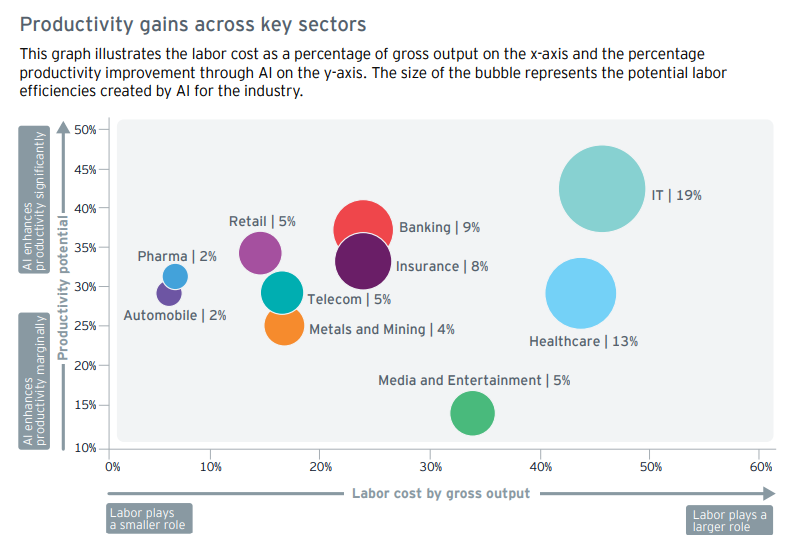
The EY's report highlights several key areas where GenAI is expected to have a profound impact:
1. Healthcare and Biotechnology
- AI-powered drug discovery could revolutionize treatment for diseases like cancer and Alzheimer’s.
- Precision medicine will personalize treatments, improving patient outcomes.
- AI-driven diagnostics could lead to earlier detection of neurological disorders such as depression and schizophrenia.
2. Governance and Public Services
- AI-powered automation in governance could streamline bureaucratic processes and reduce corruption.
- AI-enhanced public service delivery could ensure more efficient resource allocation.
3. Education and Workforce Upskilling
- AI can democratize access to knowledge, ensuring equal learning opportunities across India.
- AI tutors and adaptive learning platforms can create personalized learning experiences.
4. Economic Growth and Industry Innovation
- AI-driven agriculture and clean energy solutions could optimize resource distribution, increasing sustainability.
- AI-first business models could drive productivity across IT, financial services, and manufacturing.
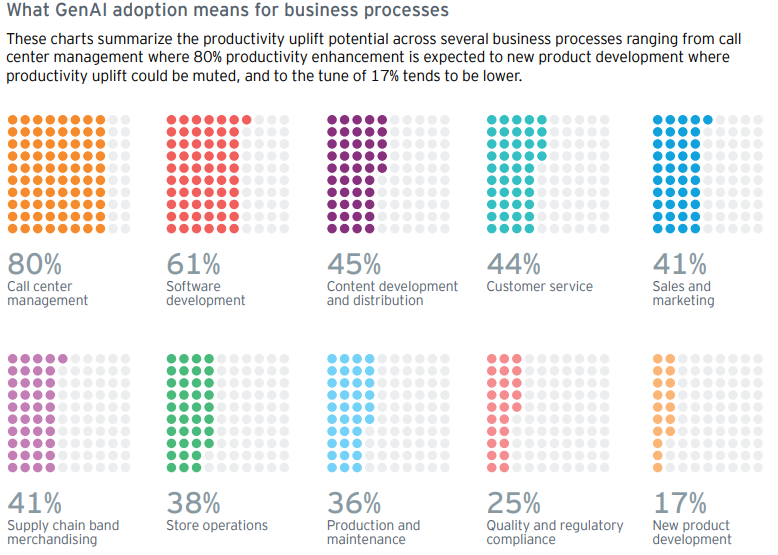
The Skepticism: Is the ROI on GenAI Justified?
Despite the enthusiasm, many industry leaders and analysts remain cautious about the real economic returns of GenAI. Despite these benefits, skeptics highlight concerns regarding AI's uncertain ROI, massive investment costs, and ethical challenges. Goldman Sachs estimates that companies will invest nearly $1 trillion in AI infrastructure in the coming years, but the tangible returns remain uncertain.
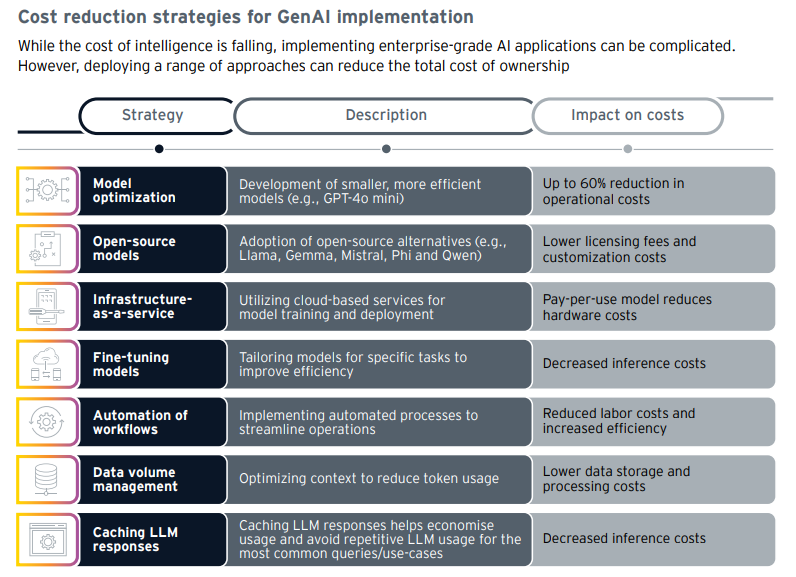
High AI Investment Costs vs. Uncertain Returns
- A Goldman Sachs report titled “Gen AI: Too Much Spend, Too Little Benefit?” warns that companies will invest nearly $1 trillion in AI infrastructure in the coming years, yet the tangible ROI remains unclear.
Slow Enterprise Adoption
- EY’s survey shows that while 36% of Indian enterprises have allocated budgets for GenAI, only 15% have moved AI workloads into full production.
- Just 8% of companies can effectively measure GenAI costs and ROI, creating uncertainty about its profitability.
Challenges in AI Deployment
- Issues like hallucinations, data privacy, and algorithmic bias make enterprises hesitant about full-scale AI adoption.
- Lack of AI-skilled talent is another barrier, with many companies struggling to integrate AI into their business models.
However, industries that successfully leverage AI are already seeing significant productivity gains.
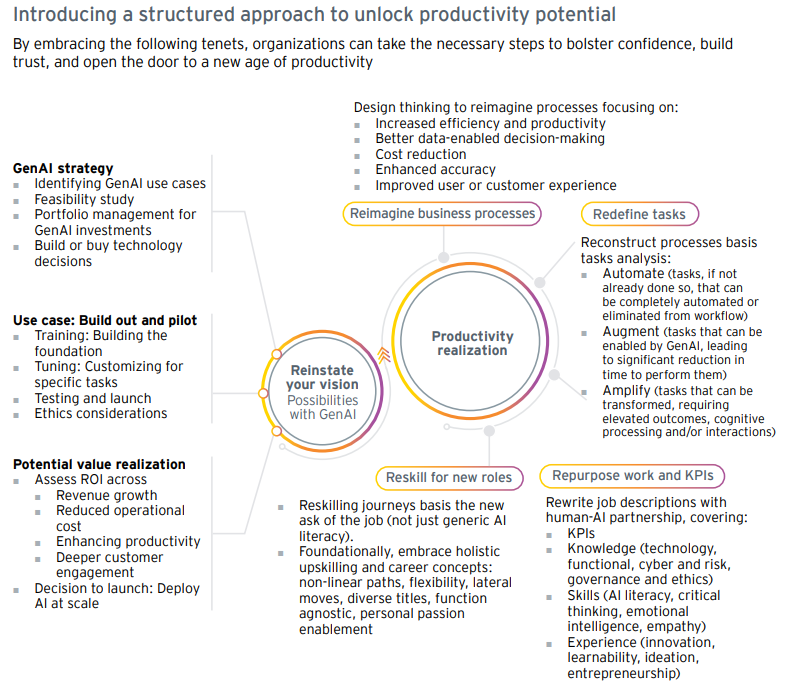
GenAI’s Sector-Wise Impact: A Game-Changer
GenAI is already reshaping key sectors with its ability to automate tasks, generate insights, and enhance decision-making.
1. IT & Business Process Management (BPM): 43%-45% Productivity Boost
India’s $245 billion IT sector stands to gain the most from AI-powered automation, code generation, and workflow optimization. With GenAI, the industry is expected to see a 43%-45% increase in productivity over the next five years.
Key AI-Driven Enhancements:



With India’s dominance in IT services, this AI-driven transformation will solidify its position as a global technology hub.


2. Financial Services: Risk Mitigation & Personalized Banking
The financial sector is undergoing a major AI-driven transformation, with fraud detection, risk assessment, and personalized banking at the forefront.
GenAI’s Impact on Finance:



The integration of AI in financial services will enhance operational efficiency, reduce risks, and provide hyper-personalized banking experiences.
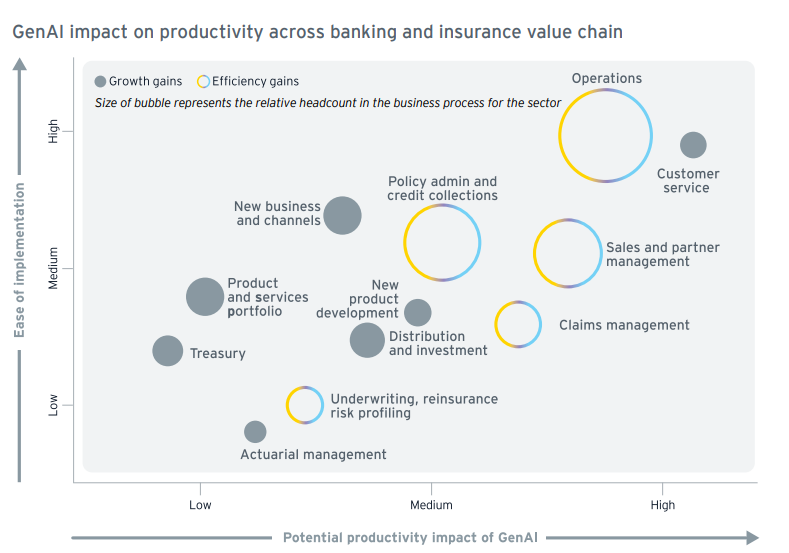
3. Healthcare: AI-Powered Diagnostics & Drug Discovery (30-40% Productivity Leap)
The healthcare and pharmaceutical sectors will see 30-40% productivity growth by 2030, driven by AI-powered research, diagnostics, and automation.
Key AI-Driven Enhancements:




AI will increase accessibility, lower costs, and improve healthcare delivery, making India’s healthcare system more efficient and effective.
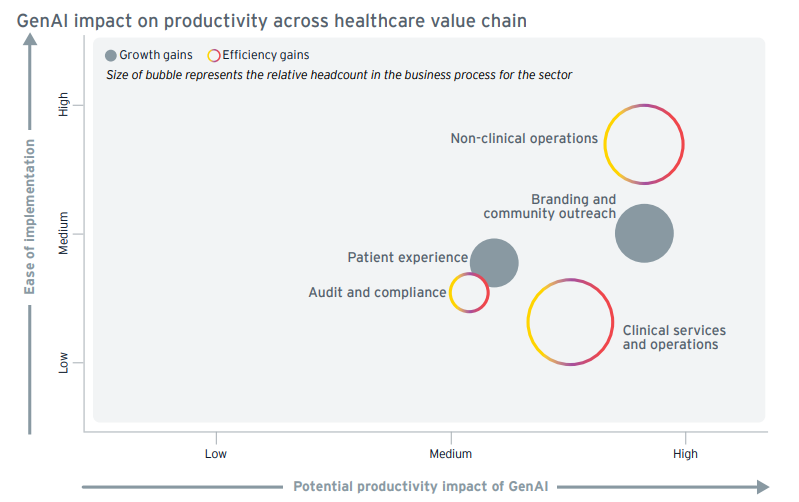
4. Manufacturing & Supply Chain: AI-Driven Efficiency
The manufacturing and logistics sectors are leveraging AI-powered predictive analytics and automation to optimize operations and reduce costs.
AI’s Role in Manufacturing:



With GenAI, manufacturers will achieve higher production efficiency, reduced waste, and streamlined logistics operations.

5. Retail & E-Commerce: Hyper-Personalization at Scale (35-37% Transformation)
GenAI is revolutionizing retail and e-commerce by enhancing customer experiences, optimizing inventory, and personalizing marketing strategies.
AI-Driven Retail Innovations:



With AI adoption in retail expected to drive a 35-37% productivity surge, businesses will increase profitability while enhancing customer engagement.

6. Automotive: AI-Driven Smart Manufacturing & Mobility (30-32% Productivity Boost)
The automotive industry is integrating GenAI for vehicle design, manufacturing, and smart mobility, with a projected 30-32% productivity increase by 2030.
Key AI-Powered Advancements:



With AI transforming design, production, and mobility solutions, India’s automotive sector is set for exponential innovation.
These improvements will strengthen India’s automotive sector, aligning it with global advancements.


Economic and Workforce Transformation
EY’s report outlines a three-phase transformation that India’s workforce must undergo to thrive in the AI-powered economy:



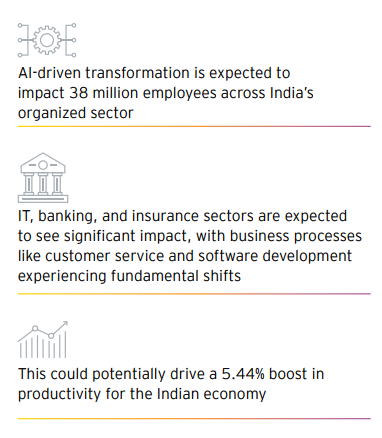
Ruth Porat, CFO of Alphabet:
"AI has the potential to be the great equaliser. We have opportunities ahead of us to address pain points (in healthcare and climate) and to address the sustainable development goals."
Key Workforce Insights:



Workforce Transformation: From Automation to Augmentation
AI will not replace jobs but redefine them by shifting work from routine tasks to AI-augmented decision-making and problem-solving.

- 24% of tasks can be fully automated, freeing up employee time for higher-value work.
- 42% of tasks will be significantly augmented by AI, improving productivity.
- AI adoption will free up 8-10 hours per week for corporate workers.
GenAI has the potential to impact 38 million jobs in the organized sector by 2030, driving a 2.61% boost in productivity.

Reskilling & Workforce Readiness To prepare for this transformation, businesses and governments must invest in AI training and upskilling.



Julie Sweet, CEO of Accenture:
"AI will create a lot of new jobs but you won’t be able to take the current people and put them in these jobs unless governments and companies partner together on reskilling."
India’s AI Infrastructure: Building a Digital Superpower
As AI adoption accelerates globally, India is making strategic initiatives like the IndiaAI Mission, BharatGen, and Indic LLMs that are driving AI innovation, workforce transformation, and sovereign AI capabilities. These efforts aim to reduce reliance on global tech giants, strengthen India’s AI compute capacity, and democratize AI access across industries and regions.
With investments in sovereign AI infrastructure, large-scale GPU deployment, and localized AI models for Indian languages, India is creating a self-sufficient AI ecosystem that fosters digital inclusion and economic growth.
 IndiaAI Mission: Driving AI-Led Innovation
IndiaAI Mission: Driving AI-Led Innovation
IndiaAI Mission, backed by INR 10,371.92 crore ($1.2 billion), aims to develop India's AI ecosystem across seven strategic pillars:







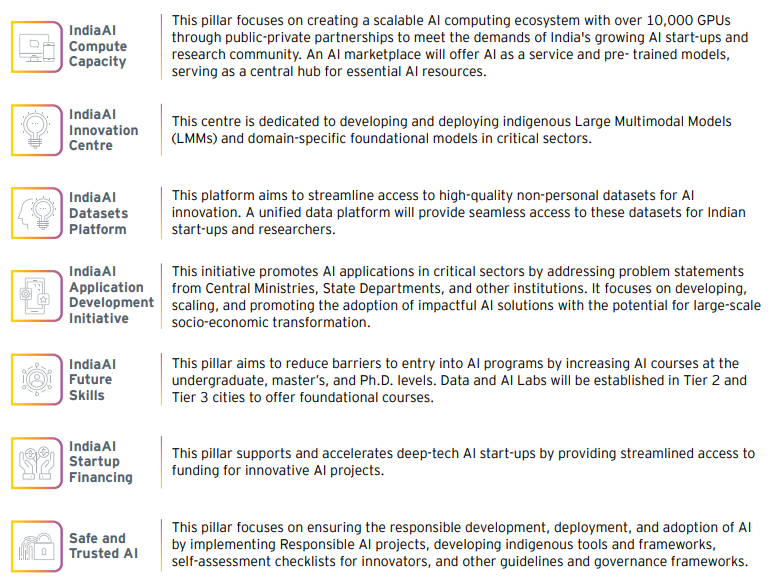
 Sovereign AI Cloud: Reducing Reliance on Global Tech Giants
Sovereign AI Cloud: Reducing Reliance on Global Tech Giants
India is investing in sovereign AI infrastructure:


 Indic LLMs & AI-Language Models: Digital Inclusion for India
Indic LLMs & AI-Language Models: Digital Inclusion for India
- Bhashini AI Project → Developing open-source datasets for Indian languages.
- Sarvam AI & Kogo.ai → AI models trained in Hindi, Urdu, Tamil, & other regional languages.
- BharatGen (Launched in 2024) → India’s first government-backed multimodal AI model.
 India’s AI-Driven Digital Transformation Initiatives
India’s AI-Driven Digital Transformation Initiatives
 Ayushman Bharat Digital Mission (ABDM)
Ayushman Bharat Digital Mission (ABDM)

 UMANG (Unified Mobile Application for New-age Governance)
UMANG (Unified Mobile Application for New-age Governance)

 BharatGen (India’s First Public LLM Initiative)
BharatGen (India’s First Public LLM Initiative)

Key Laws Governing AI and Digital Transformation in India
Stephen Hawking, Theoretical Physicist:
"Success in creating AI would be the biggest event in human history. Unfortunately, it might also be the last, unless we learn how to avoid the risks."
India is developing a robust legal framework to regulate AI and digital transformation while balancing innovation and ethical concerns.
1. Information Technology Act, 2000 (IT Act)
The foundation of India's cybersecurity and electronic transactions, applicable to AI in areas like data protection and cybersecurity.
2. Digital India Act (DIA) (Proposed)
Expected to replace the IT Act, covering AI, 5G, IoT, blockchain, and ethical AI regulations.
3. Digital Personal Data Protection Act, 2023
Regulates data privacy, localization, and AI-driven data processing, ensuring stricter compliance.
4. IT Rules, 2021 (Intermediary & Digital Media Guidelines)
Mandates compliance for AI-powered platforms like social media and content moderation systems.
5. National Strategy for AI (NSAI), 2018
Focuses on ‘Responsible AI’, preventing bias and ensuring ethical AI deployment.
6. Sector-Specific Regulations


As AI adoption accelerates, new laws and policies will emerge to shape India's AI-first future.
Strengthening India’s AI Regulatory Framework
India is currently formulating comprehensive AI regulations under the IndiaAI Mission, inspired by global best practices. Key areas where India can enhance its legal framework include:
1. AI & Data Privacy
- India’s Digital Personal Data Protection Act (2023) already provides data localization mandates, but lacks specific AI data protection guidelines.
- The USA’s CCPA mandates disclosure of AI-driven data processing, which India can replicate for greater transparency.
2. Deepfake & AI Misuse Laws
- The USA criminalizes AI-generated child exploitation, non-consensual deepfakes, and election-related misinformation.
- India needs dedicated deepfake regulations, particularly for political campaigns, fake news, and impersonation fraud.
3. AI Ethics & Bias Prevention
- The EU AI Act enforces risk-based AI governance, requiring bias audits, human oversight, and transparency mandates.
- India could introduce similar risk-tiered regulations, ensuring fairness in AI-driven hiring, credit scoring, and law enforcement applications.
4. AI Accountability & Corporate Responsibility
- The USA mandates AI-generated content labeling in political ads and healthcare communications.
- India could extend similar accountability measures to AI-powered financial advice, legal tech, and automated job screening systems.
While India’s IndiaAI Mission and Digital India Act set the foundation for AI governance, enhanced AI-specific lawsare needed to:




Conclusion: The Road Ahead for India's AI-First Future
Generative AI is not just a technological revolution—it is an economic force that will reshape India's industries, workforce, and governance. With projected GDP contributions of $359-438 billion by 2030, AI is set to transform IT, finance, healthcare, retail, manufacturing, and governance, making India a global AI powerhouse.
However, realizing this potential requires strategic action. While investments in IndiaAI Mission, sovereign AI infrastructure, and Indic LLMs are setting the stage for self-reliance, key challenges remain—from AI ethics and bias prevention to deepfake regulation, corporate accountability, and workforce reskilling.
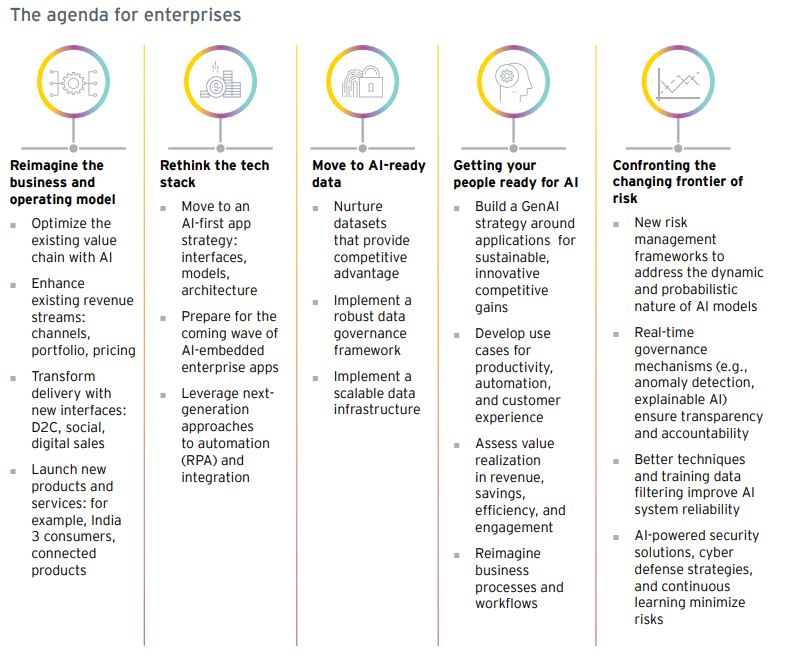
To fully leverage AI's potential, businesses, policymakers, and academia must collaborateto ensure:



"The rise of AI is not about machines replacing humans, but about humans working smarter with machines. The future belongs to those who embrace and shape this transformation." – Sundar Pichai, CEO of Google
India has the talent, infrastructure, and vision to lead the global AI revolution. The question is not whether India will succeed—but how fast and effectively we can scale this transformation. The time to act is now.



 Ask an Expert
Ask an Expert




